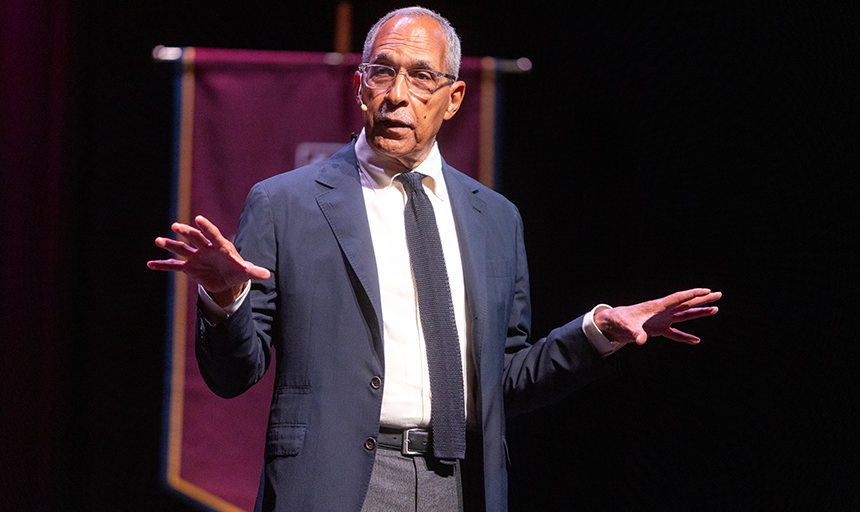Social psychologist Claude Steele talks identity, stereotypes and building trust
September 19, 2023
Category: Center for Studying Structures of Race

How can a community be successfully integrated, allowing members to contribute from the standpoint of their backgrounds and identities without feeling they are going to be discriminated against for those backgrounds and identities?
That question is at the heart of social psychologist Claude Steele’s research, which examines racial and gender gaps in academic performance, and it was the foundation of his lecture at Roanoke College on Monday night. Steele, a professor of psychology emeritus at Stanford University, is the author of “Whistling Vivaldi: How Stereotypes Affect Us and What We Can Do.” The book was selected last year for a community discussion at Roanoke College that was sponsored by the Center for Studying Structures of Race (CSSR). Prior to his lecture, Steele spent time talking with a group of students and answering their questions.
In Olin Theater on Monday, Steele said negative stereotypes exist for every identity group in America, so we are all susceptible to stereotype threat, or the fear of conforming to a negative stereotype about our identity group. For example, he said, at a school conference between Black parents and a white teacher, the parents may fear being seen as uninvested in their child’s development while the teacher may fear saying the wrong thing and coming across as racist.
This kind of pressure makes it difficult for people to live up to their full potential and have honest, genuine interactions with members of other identity groups, Steele said, because it is difficult for a person to forget how their identity group has historically been seen – and to avoid interpreting a situation or interaction through that lens. “I would argue… that is the central challenge about diversity: It’s a matter of trust,” he said. “How do we trust each other, relax with each other and have an easy exchange with each other?”
Through a set of experiments that measured the impact of stereotypes on student behavior, Steele and his colleagues discovered that the antidote to stereotype threat is surprisingly simple: When the threat is addressed head-on and people’s values and abilities are acknowledged, the toxic ambiguity is removed and people often find the confidence and cultural capital to perform at the top of their abilities.
Steele’s talk, which was sponsored by the CSSR, the Office of the President and the Fowler Public Affairs Lecture Series, is part of a yearlong conversation at Roanoke about building community, which is the theme of President Frank Shushok Jr.’s upcoming inauguration. Steele said he’s long been fascinated by “beloved communities” such as those that gave rise to the American Civil Rights Movement, and he has studied some of those communities, including one large, integrated church congregation in Little Rock, Arkansas.
A common denominator in these communities, he said, is that they are places where “a fundamental tenet of being a decent human being is being open to difference, having an openness to trust, and being interested in difference and what it can teach you."
“Diversity is one of the great strengths that America has,” Steele said. “This is part of the secret sauce that we can draw from for so many different perspectives and experiences in the world.”
